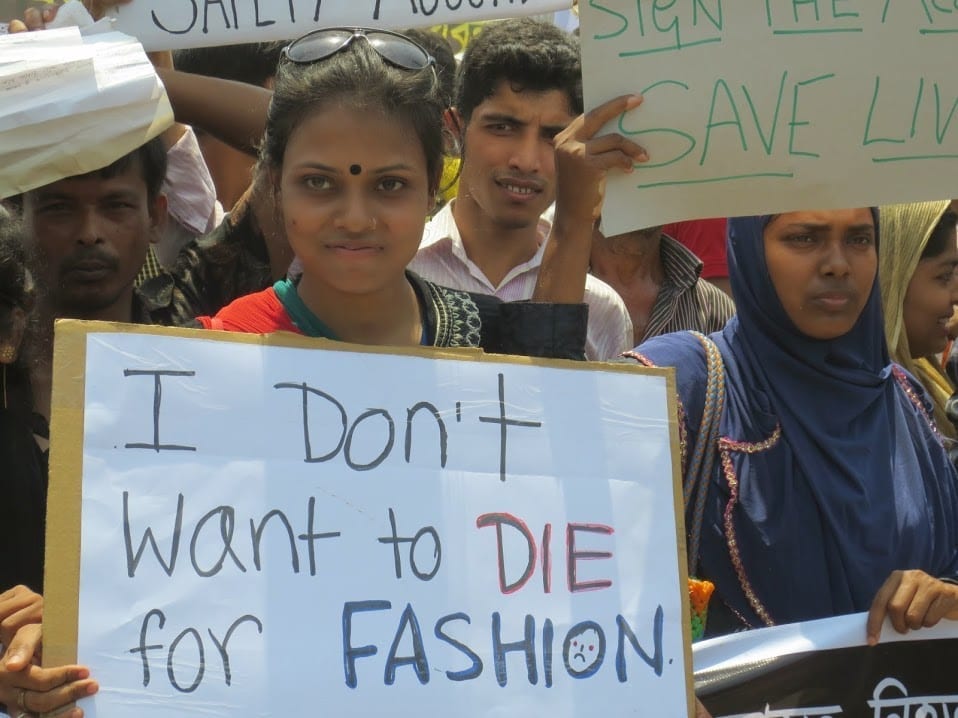
Apr 5, 2016
Four years after the tortured, lifeless body of Bangladesh garment worker organizer Aminul Islam was discovered in a ditch, his killers have yet to be arrested. Yesterday the Bangladesh Garment and Industrial Workers Federation (BGIWF) and Bangladesh Center for Workers Solidarity (BCWS) demanded that authorities find and bring Aminul’s killers to trial.
Aminul was a well-respected labor leader among workers at Savar- and Ashulia-area garment factories in suburban Dhaka, the capital. At the time of his death, he was a BCWS organizer and BGIWF regional president, and working to resolve a dispute between workers and managers at a nearby factory. The police filed a case accusing an agent of National Security Intelligence (NSI) with the crime, but he escaped. The BGIWF and BCWS, both Solidarity Center allies, complain that the case was filed without a proper investigation, and rules for collection of primary evidence were not followed.
At a Dhaka press conference yesterday, Babul Akter, BGIWF president, demanded that the Ministry of Home Affairs reopen the case and conduct a legitimate investigation, including DNA testing of Aminul’s clothes, to identify, arrest and prosecute the murderers.
Since Aminul’s murder, more than 1,100 Bangladeshi garment workers have been killed on the job and at least 3,600 have been injured, including workers in a factory fire at Tazreen Fashions in November 2012 and in the collapse of Rana Plaza in April 2013. Aminul sought to improve the hazardous conditions many garment workers still face, as well as to redress exploitation such as wage theft. He believed that the lack of fire safety measures and other protections for workers could most effectively be addressed by workers who freely form unions and collectively bargain to improve workplace conditions.
Balmi Chisim is based in the Solidarity Center’s office in Dhaka, Bangladesh.
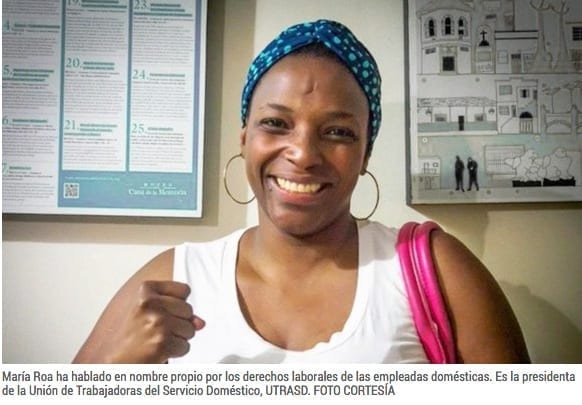
Mar 31, 2016
Afro-Colombian domestic workers, historically among the most marginalized workers in the country, are increasingly joining together to improve their working conditions and educate lawmakers and the public about their rights as workers.
“Today, it is a breakthrough that Afro-Colombian women are being empowered and raising awareness of the need to organize, to establish a collective space in which to be a social dialogue to claim their labor rights and interests,” writes Javier Arenas Bergaño at the Centro Atenciόn Laboral, a pro-bono legal organization in Colombia.
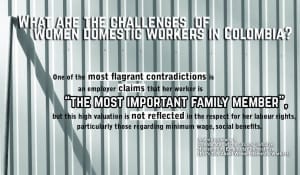
Credit: IDWF
In Colombia, where some 750,000 of the roughly 1 million domestic workers are women, Afro-Colombian domestic workers especially have suffered discrimination, due to lack of access to education, health care and other services and because they are treated unequally in the job market and at the workplace.
Through the Union of Domestic Service Workers (UTRASD), the first-ever union in Colombia created entirely by Afro-descendant women in 2013, domestic workers are making their voices heard. A year after the union formed, Colombia ratified the International Labor Organization (ILO) standard covering domestic workers (Convention 189), which provides a framework for the country’s domestic workers to pursue their rights on the job.
Led by María Roa, a former domestic worker and founder of Let’s Talk about Domestic Workers, UTRASD was founded with the support of two Colombian nongovernmental organizations, Escuela Nacional Sindical (ENS) and Corporación Carabantú, and the Solidarity Center.
As Bergaño points out, by joining together to secure the same basic rights as those available to other workers, including weekly days off, limits to hours of work, minimum wage coverage, overtime compensation and clear information on the terms and conditions of employment, domestic workers reclaim their rightful place as full participants in democratic society.
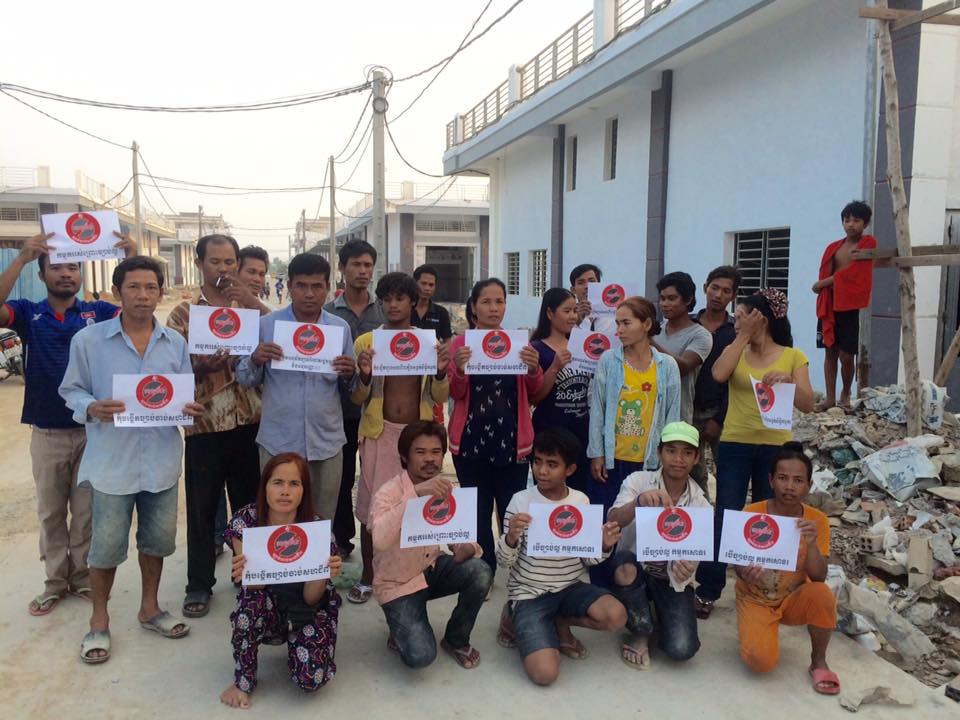
Mar 30, 2016
Workers across Cambodia are waging rallies to protest a draft labor law that, according to the International Trade Union Confederation (ITUC), does not meet basic worker rights standards under international law.
Carrying signs reading, “Do not create a law that oppresses worker rights” and “Workers survive because of good laws,” workers are taking a stand against the law that, if passed, would violate International Labor Organization (ILO) standards on freedom of association and protection for the right to form unions (Convention 87) and the right to bargain collectively (Convention 98).
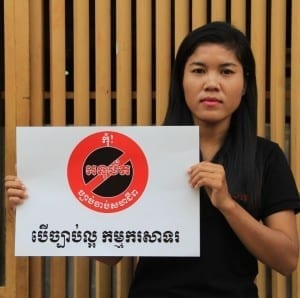
Cambodia’s draft labor law would make it easier for the government to break up unions. Credit: Um Mumsreypech
Workers from a wide variety of jobs also are posting on Facebook images of themselves and their co-workers with signs urging the government to pass a law that respects the rights of workers. (You also can follow the actions on Twitter with the hashtag #SayNoUnionLaw.)
In a letter sent this month to Cambodian Prime Minister Hun Sen, ITUC General Secretary Sharan Burrow urged the Cambodian government to work with unions to ensure the law is consistent with international labor standards. “We shall oppose any law which does not fully respect these rights,” Burrow wrote.
For instance, a strike would be legal only if approved by more than 50 percent of participants at a union meeting where more than half the union members are present—effectively making strikes impossible for unions with several thousand members.
The strike provision would especially impact the nation’s 700,000 garment workers, limiting their ability to seek improvements at the workplace. A Human Rights Watch report last year found that many Cambodian garment factories repeatedly violated fundamental worker rights, such as issuing unlawful short-term contracts to intimidate and control workers, and to avoid paying maternity leave and other benefits to the predominantly female workforce.
Ath Thorn, president of the Coalition of Cambodian Apparel Workers Democratic Union, told The Cambodia Daily that the limitations on calling a strike are a big concern. “In the Constitution, even one person can make a strike or demonstration,” he said. The Constitution says the right to strike and demonstrate “shall be exercised within the framework of law.”
The draft law also would enable courts to break up unions for infractions committed by a union leader.
Workers and their unions, along with community advocates, had worked on a draft trade union law several years ago that incorporated fundamental worker rights, but the draft died on the desks of the Council of Ministers. Cambodia union leaders say the current draft was compiled with minimal input from workers and their unions. It now goes before the National Assembly April 4.
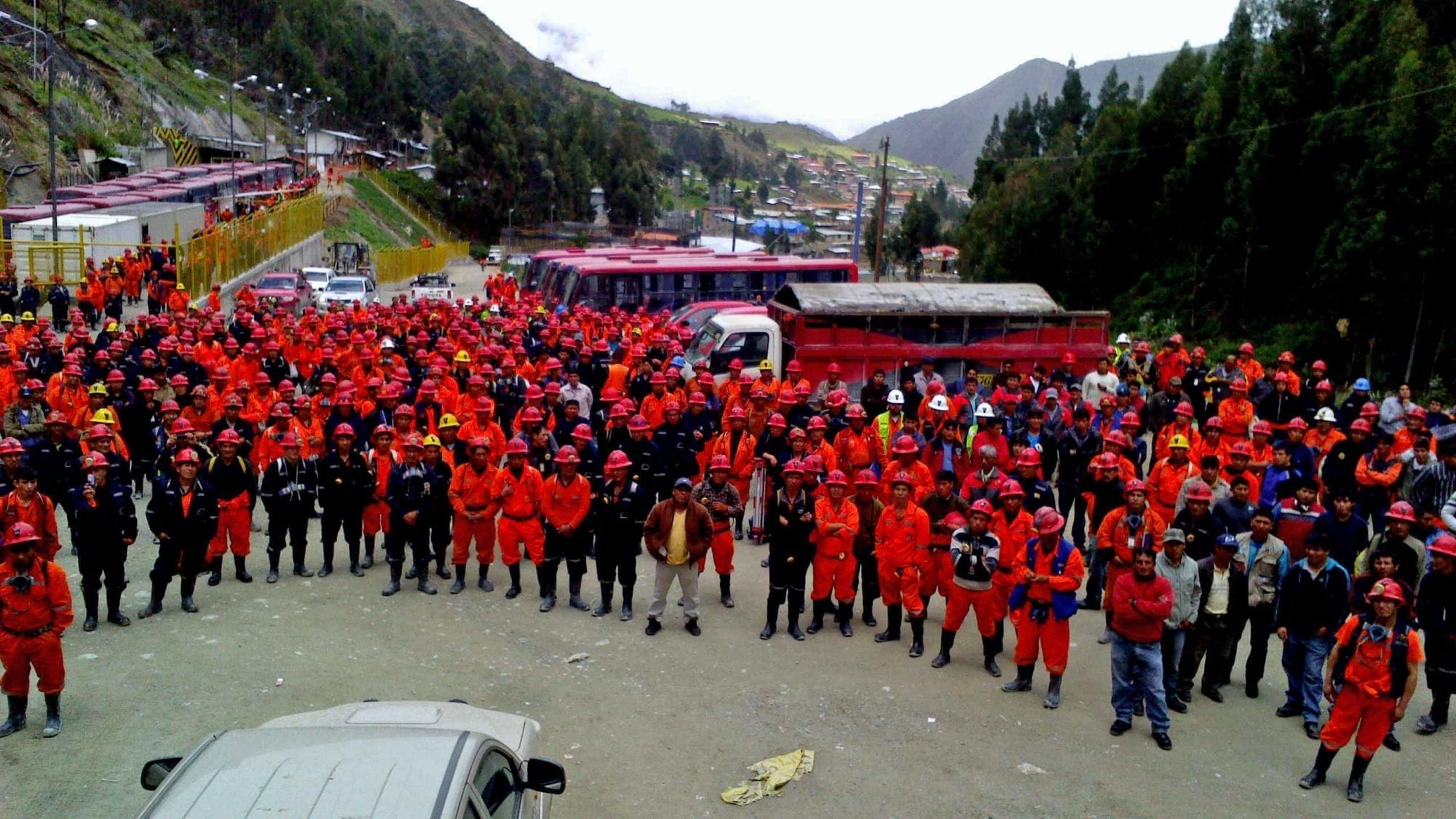
Mar 29, 2016
Oscar Muro, Solidarity Center program officer in Peru, reports on his late February fact-finding journey to the Minera Aurifera Retamas (MARSA) mine, where subcontracted mineworkers, represented by a strong union, won a national labor inspection finding that calls for 2,464 outsourced workers to be moved to permanent contracts. The workers subsequently went on a weeklong strike to protest the employer’s appeal of the judgment and a ruling by the regional labor authorities that MARSA should not be fined for misclassifying workers. The national labor inspection office indicates it will return to the mine in a few weeks to ensure the company has correctly classified miners.
……………..
Together with Ricardo Juárez, secretary-general of the Federation of Mine and Metalworkers of Peru, and Elder Villalobos, secretary general of the union of workers of the companies of MARSA, I traveled to the mining center in the mountains of La Libertad to attend the union’s extraordinary general assembly. There, the secretary general told the 4,500 workers in attendance that, following mine inspections, the national Superintendent of Labor Inspection had ruled in favor of 2,464 of 4,000 subcontracted workers, stipulating that they become permanent workers.
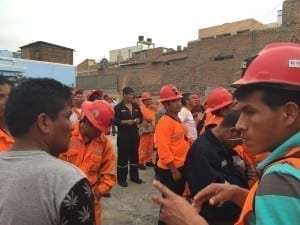
Miners are standing strong in their demands for permanent contracts. Credit: Solidarity Center/Samantha Tate
Many MARSA workers have labored in dangerous conditions for up to 20 years, but without a contract. Their “non-permanent” status means their livelihoods are jeopardized if they raise safety issues with their employer, or demand decent wages that allow for a life with dignity.
In January, one miner died on the job, and two miners perished in 2014. In November 2015, there was a deadly radiation poisoning and suffocation incident at the Taurus mine.
Mine is Rich, Yet Residents still Poor
The MARSA mine, 4,000 feet above sea level in the Southern Highlands, produces gold in large quantities and ranks among Peru’s top five gold producers. The journey to MARSA takes more than 14 hours from the northwestern coastal city of Trujillo. To reach the mining center, we had to cross hill after hill on a single-lane road. When our bus encountered a vehicle coming the opposite direction, the vehicles struggled to pass each other on the narrow stone trail. We made the trip to join our co-workers who need us, and thank God, everything went well.
Some 7,000 people live in Llacuabamba, the village where the MARSA mine is located. Despite the wealth beneath their soil, the residents do no benefit from investment, such as proceeds from mining licenses. Instead, their village suffers from poor sanitation infrastructure and is so isolated that residents do not receive newspapers and often do not have access to television because of the weak Internet signal.
Solidarity with Miners
Together with Juárez and Villalobos, we conveyed to the workers that we stand in solidarity with them in their struggle until they achieve victory: worker rights through permanent contracts.
During this journey, we also learned about informal mines in the area, which employ between 3,000 and 5,000 miners. Further, at the nearby Consortium Horizon mine, the more than 4,000 employees have sought to form a union several times, only to see many workers fired. We have much work ahead to assist all of these workers in getting permanent contracts and the safe and healthy working conditions all workers deserve.

Mar 24, 2016
The East African Trade Union Federation (EATUC)—representing national trade union centers in Burundi, Kenya, Rwanda, Tanzania and Uganda—is conducting a regionwide campaign for passage of a social security portability bill through the East African Legislative Assembly (EALA). Passage of the bill into law will benefit citizens crossing borders within six member countries of the East African Community (EAC) for employment, by allowing them to carry their social security benefits with them.
“This bill can benefit millions,” said Caroline Mugalla, head of EATUC.
Many workers, including those laboring in the informal economy, are migrating across borders within the EAC for new job opportunities under the EAC Free Movement of Persons Protocol.
Most citizens of the region, 80 percent of whom labor in the informal economy for low wages, are not covered by pension schemes, but by creating a legal framework for regional cooperation on pensions, the EATUC-sponsored bill makes possible a harmonized system that can eventually cover all the region’s citizens, says Mugalla.
“We already see creative pension savings schemes in Kenya,” she said, where low-wage workers can save earnings through a mobile banking system accessed by cell phone, making contributions of any amount at intervals of their choice, and invest in an infrastructure government bond for as little as $28.
Free movement of labor benefits the employer through access to a larger labor pool, but can hurt workers economically when they leave benefits behind or must pay into the social security fund of the country to which they have moved (where they may not retire) and, a second time, into the fund of the country from which they emigrated if they wish to maintain eligibility.
EATUC—with assistance from national trade union centers in member countries—has built support for passage of the bill from employers in the region, as well as from some EALA legislators.
During the coming months, EATUC will reach out to union members, citizens of the region, community groups and others to build popular support for passage of the social security portability bill through EALA later this year.
“We will succeed,” said Mugalla. “The bill is supported by 2.8 million union members and more than 800 employers in East Africa (in the East African Employers Organization).”
Passage of the bill—which will create a legislative framework for portable social security benefits within the region—will potentially impact millions of working people because legislation passed by EALA is binding on all member countries.
Up to 80 percent of workers across the region labor in the informal economy, many as domestic workers, street vendors and taxi drivers.
Members of the EAC include Burundi, Kenya, Rwanda, Tanzania, Uganda and, with the addition of South Sudan this month, has a population of 162 million people.








